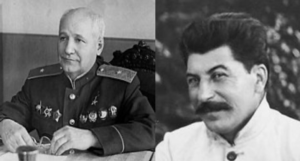Lecture Date: January 28, 2021
The Irene and Curry Roberts Lecture

The totalitarian system that Joseph Stalin built in the 1930s relied heavily on terror to keep Soviet citizens in line. It also forced them to work for a dictator who took credit for his country’s successes and blamed others for its catastrophic failures. Millions of Soviet citizens suffered under Stalinist repression to such a degree that the Soviet Union was ill prepared to meet Nazi Germany’s invasion of the USSR in June 1941. One such victim was Andrei Nikolaevich Tupolev, an aviation pioneer whose aircraft designs had already made him a household name before the war. Instead of executing Tupolev, Stalin forced him to work inside the Gulag on airplane designs for the war and the dictator’s glory. And soon after the war, Tupolev obliged Stalin’s obsession with American technology by reverse engineering the B-29 bomber. Unlike most of Stalin’s victims, Tupolev outlived the dictator and led a design bureau that propelled the USSR into the Jet Age and even produced a supersonic passenger aircraft. Born in 1888, Tupolev’s incredible career spanned Russia’s turbulent 20th century from Tsar Nicholas II to Leonid Brezhnev before his death in 1972. This lecture explores Tupolev’s life, his relationship to Stalin, and how his cutting-edge designs for military and civilian aircraft helped make the Soviet Union an aviation superpower.
For further reading on Andrei Tupolev, see an op-ed by Steven Harris, published in the Free Lance-Star on January 27, 2021.
Speaker: Steven Harris

Steven E. Harris is a historian of modern Russia and Europe. He is presently writing a new book, “Flying Aeroflot: A History of the Soviet Union in the Jet Age,” which examines the Soviet airline and aviation culture in late socialism. Among his many courses at the University of Mary Washington, Harris teaches an upper-level seminar, “Empires of the Air: Histories of Aviation and Space in the Modern World.” Funding for Harris’s book project has been generously provided by UMW through a Waple Professorship (2016-2018) and through a Verville Fellowship at the National Air and Space Museum in Washington, DC (2016-2017). Most recently, Harris received a summer stipend from the National Endowment for the Humanities to complete research on this book project in Moscow in summer 2021. Harris’s first book, Communism on Tomorrow Street: Mass Housing and Everyday Life after Stalin (The Woodrow Wilson Center Press and the Johns Hopkins University Press, 2013), shows how Soviet citizens’ move from communal housing in the Stalin era to the single-family separate apartment of the Khrushchev years fundamentally transformed the post-Stalinist “thaw” from an elite into a mass phenomenon.